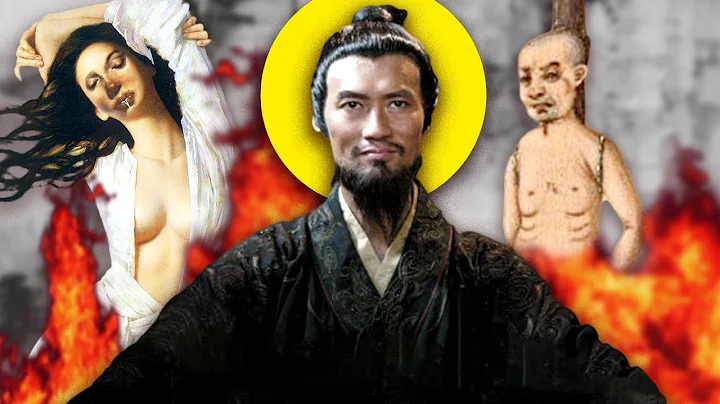Foreword
No one can escape death, and the emperor is no exception. The old emperor died, and the new emperor had to face a problem when he came to the throne, that is, the harem left by the previous emperor. It is said that the harem beauties are three thousand, the old emperor is three thousand, and the new emperor is also three thousand. If you don't leave the old emperor behind and deal with those harems, where can you put the new ones? So after ascending to the throne, you have to deal with the predecessor’s harem. The processing method is worth talking about.
伴fu
The new emperor usually handles the former concubines in five ways: one burial, the second guard, the third monk, the fourth death, and the fifth inheritance. Let me talk about the funeral. After the old emperor died. The concubine also had to commit suicide and was buried with the old emperor. Why should they be buried? To put it plainly is to prevent the old emperor from cuckolding. So burial is equivalent to locking the concubines in a safe.
The funeral system was most prevalent during the Ming Dynasty. Everyone knows that Zhu Yuanzhang, the founding emperor of the Ming Dynasty, was originally a grassroots and a beggar, so he was very inferior and suspicious, so he was particularly concerned about the color of his hat after death. When I was alive, he made arrangements: After I die, all concubines who have not had children will be buried. There is a clear record of Daming's burial in the secret archives of Da Nei. The method of death is very simple. One person hangs himself with a white silk. The concubines stood in a row, all hanging their necks, the eunuch yelled from below to send the concubine on the road, and the stool was kicked off! Before committing suicide, let them dress up, freshen up, let the chef cook a delicious meal, eat and drink before they go on the road. After he died, the eunuch handed the corpses to the funeral team and arranged for the funeral.

守灵
The second kind of guard. The Chinese are superstitious, saying that they are guarded in the emperor's cemetery. If you talk to him in the cemetery, he can receive it by burning a piece of paper. Therefore, keeping the spirit is actually a way to accompany the dead emperor. Shouling, this is the most in the Han Dynasty. In the early years of the Western Han Dynasty, Empress Lu was very jealous, she was especially jealous of Liu Bang's favored concubines, so after the death of the great ancestor Liu Bang, Empress Lu sent all the barren concubines to the cemetery. Keeping the spirit is not easy to do. Han Yu once said that the guardians should wait for the emperor's daily life in the hills, and regard death as life. It is much harder to treat the dead as living people than to serve the living!
Cao Cao made a will and ordered his little wife Kabuki to sing and dance to his grave regularly after his death. There is no good treatment in the guarding place. It is even more desolate than the cold palace. It can't eat well and sleep well, and it's especially lonely. Therefore, the concubine of the guard generally cannot die well. Emperor Han Cheng had a favorite concubine named Ban Jieyu, who was particularly talented, proficient in history, able to write poetry and painting, and was beautiful. Emperor Han Cheng was conquered by his talent and beauty and loved her in every possible way. But then the Zhao sisters turned out to be born, and she gradually fell out of favor in the harem. After the death of Emperor Han Cheng, in order to avoid the devastation of the Zhao sisters, she invited herself to guard the spirit, and died of illness after less than a year. To the delight of the people, Zhao Feiyan, who was invincible, committed public anger, was condemned by the officials, and later came to guard the spirit. She knew how hard it was to guard the spirit, so she committed suicide that day, she would rather die than guard the spirit.

monk
The third kind of monk. Monkhood was most popular in the Tang Dynasty, and Wu Zetian is an example. Wu Zetian is actually Li Shimin's concubine and the stepmother of Tang Gaozong Li Zhi. After Li Shimin's death, she went to Ganye Temple to become a nun with all the concubines without heirs, and was later taken back to the palace by Li Zhi and became Li Zhi's wife. In fact, sending the concubine to the nun's nunnery is similar to burial and guarding. The royal temple does not entertain pilgrims outside the royal family, so the concubine's chastity can be preserved here, and the old emperor does not need to cuckold.

Wait for death
The fourth class is to wait for death, which is a more popular practice in the Qing Dynasty. There is a special place in the Forbidden City where these former concubines and concubines from the former dynasty were housed, that is, Cining Palace. There is also a Widow’s House in Cining Palace. This Ci Ning Palace is similar to the Leng Palace. Those who actually stay in Ci Ning Palace are the widows and widows who have lost power. They reigned as the emperor.When I was squeezed out and left out, my life at Ci Ning Palace was even more sad. Some low-status toffees usually only get a small amount of money! The monthly salary is just enough for food and clothing, and sometimes widows who are living in a difficult life have to do some needlework on their own, so that the eunuch maids secretly get them out of the palace and exchange them for a little bit of silver. Once admitted to the widow's house, it is undoubtedly sentenced to life imprisonment. To put it bluntly, he waited for his death here, and it was also a festival for the old emperor.

Inheritance
The last one is inheritance. In the Yuan Dynasty, it was particularly popular to call Shoujimarry, that is, when the father died and the son married the stepmother, the older brother died and the younger brother married the widow. There are two reasons for this custom in the first place. One is that there are few women and they cherish it, so if you marry a daughter-in-law, the family can make the best use of everything. Don’t waste it. The second of course is that this woman has no status, just like The objects are the same, there is no need to consider whether they are willing or not! In the early days of China, marriages existed. In the Spring and Autumn Period, Wei Chaobo, the son of Wei Xuangong, married a stepmother and gave birth to three sons and two daughters. But by the end of the Warring States period, this kind of behavior in the Han nationality was regarded as incest and was forbidden by national legislation, but the ethnic minorities were not as advanced as the Han nationality! This phenomenon occurred in the Yuan Dynasty, including in Chinese history that Wang Zhaojun married Shan Yu not for one generation but for two generations. Princess Wencheng also faced this problem when she entered Tibet.

Conclusion
to the old emperor to observe the festival, and treat the chastity of a woman as a man’s possession. In fact, there are many people like this now. When women and chastity are separated, women can truly be independent and happy. Want to know more about strange things? Let's listen to "Secrets of Wild History".

![[Full Movie] Rise of Tang Dynasty 1 | Chinese History & War Action film HD - DayDayNews](https://i.ytimg.com/vi/_C0q_Lek3jA/hq720.jpg?sqp=-oaymwEcCNAFEJQDSFXyq4qpAw4IARUAAIhCGAFwAcABBg==&rs=AOn4CLA9rePuhzXKdGcDwUFZ1RNN3GynaQ)
![[Full Movie] Rise of Tang Dynasty 1 | Chinese History & War Action film HD - DayDayNews](https://cdn-dd.daydaynews.cc/img/play.svg)





![[Full Movie] Rise of Tang Dynasty 2 | Chinese Historical War Action film HD - DayDayNews](https://i.ytimg.com/vi/NK1SOefwYaA/hq720.jpg?sqp=-oaymwEcCNAFEJQDSFXyq4qpAw4IARUAAIhCGAFwAcABBg==&rs=AOn4CLDdnxT-kUF4ArXQ0Y8q0Mt7XbUPMg)













